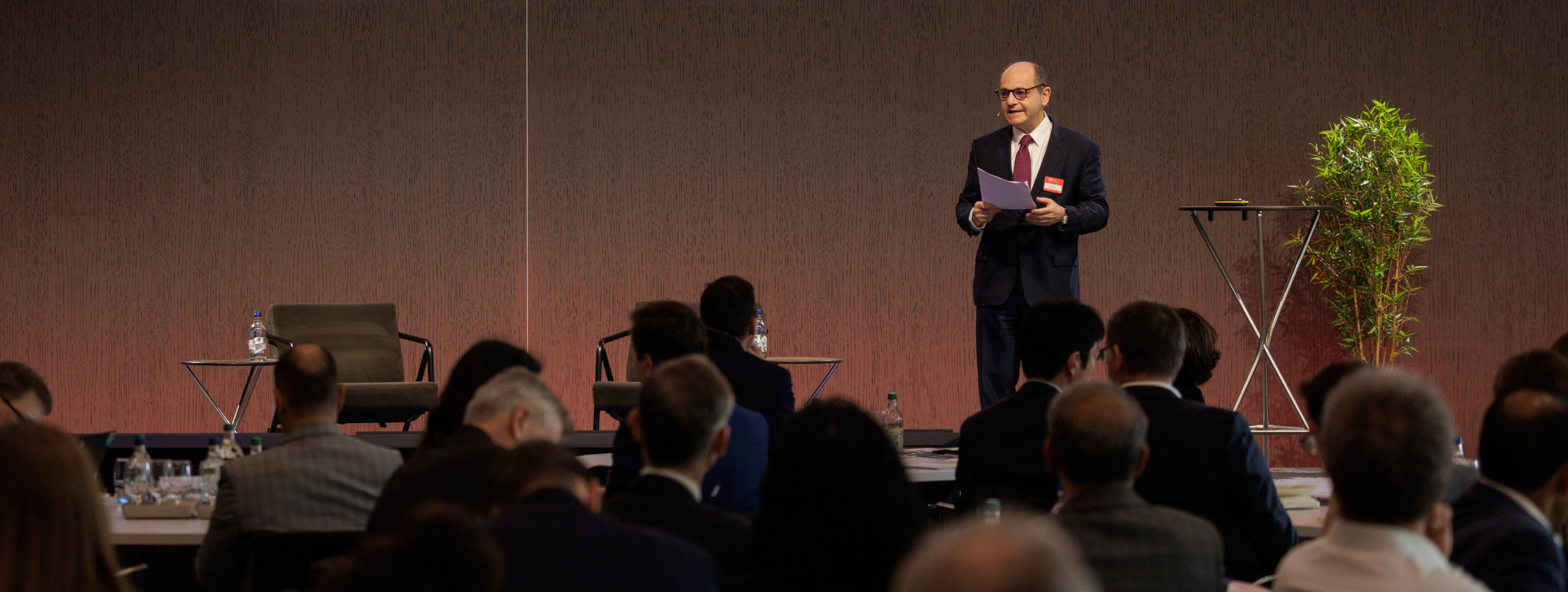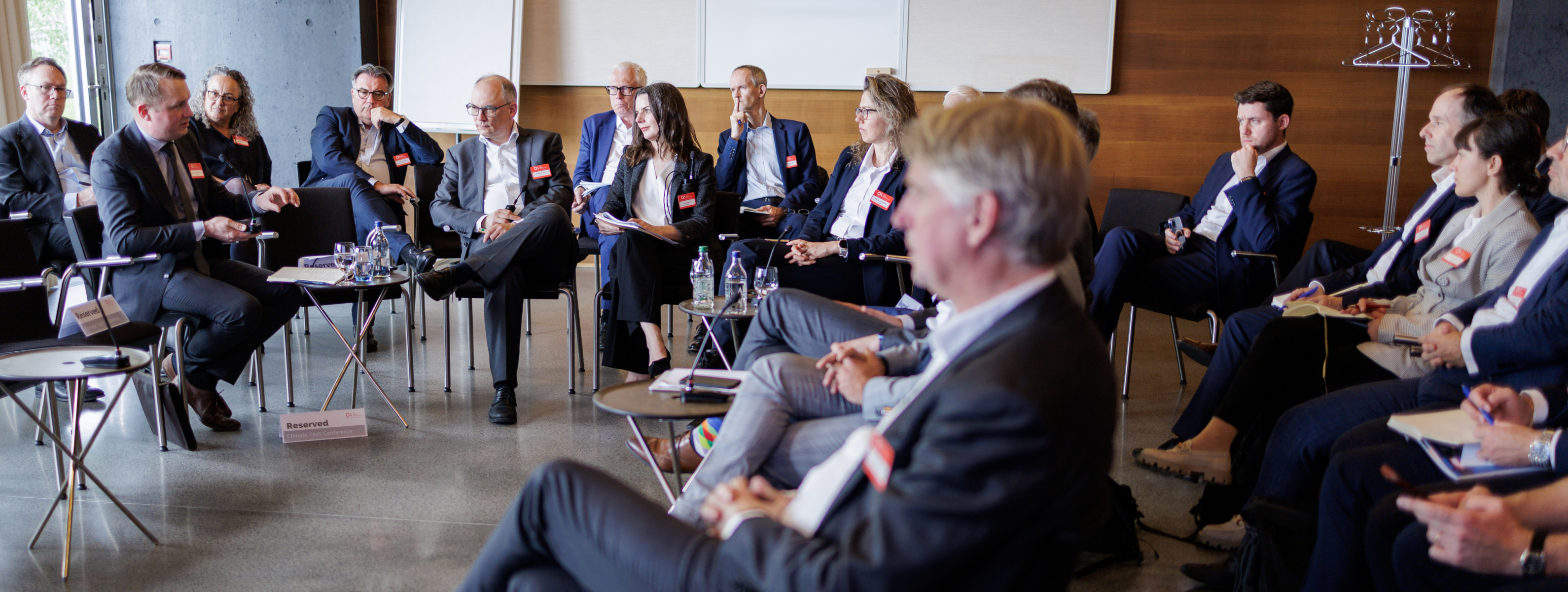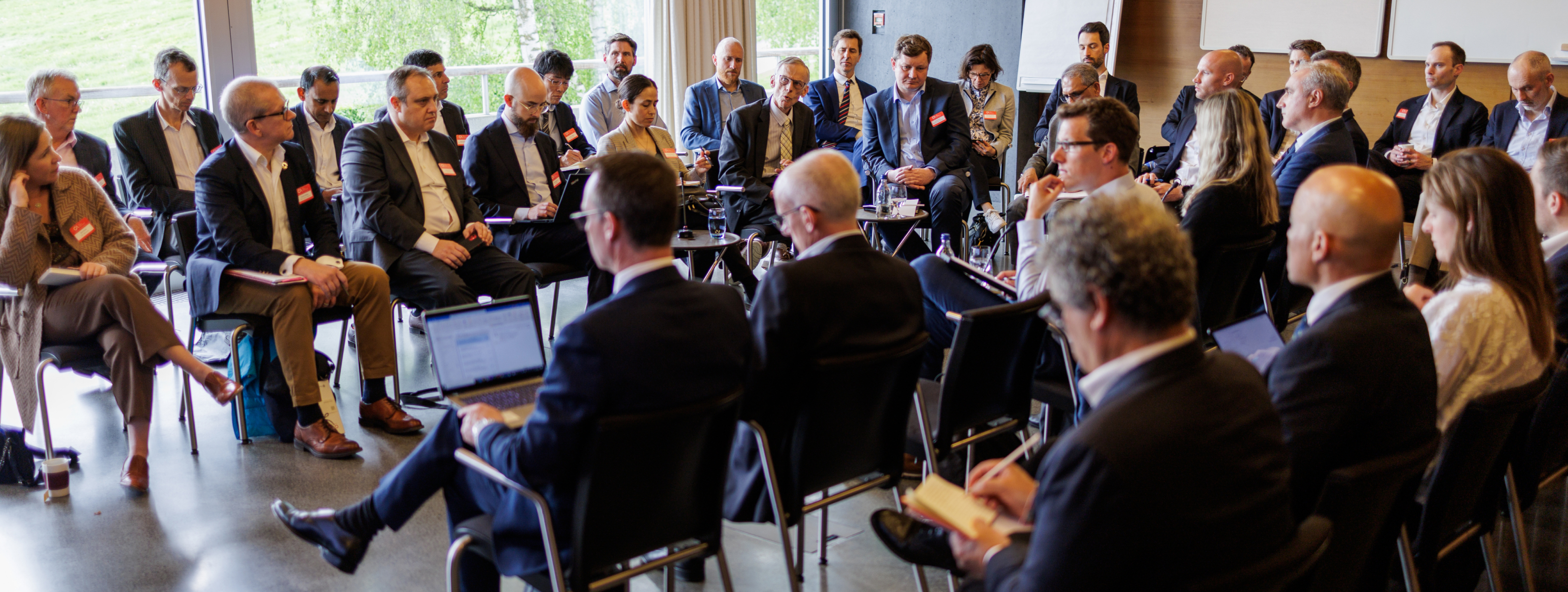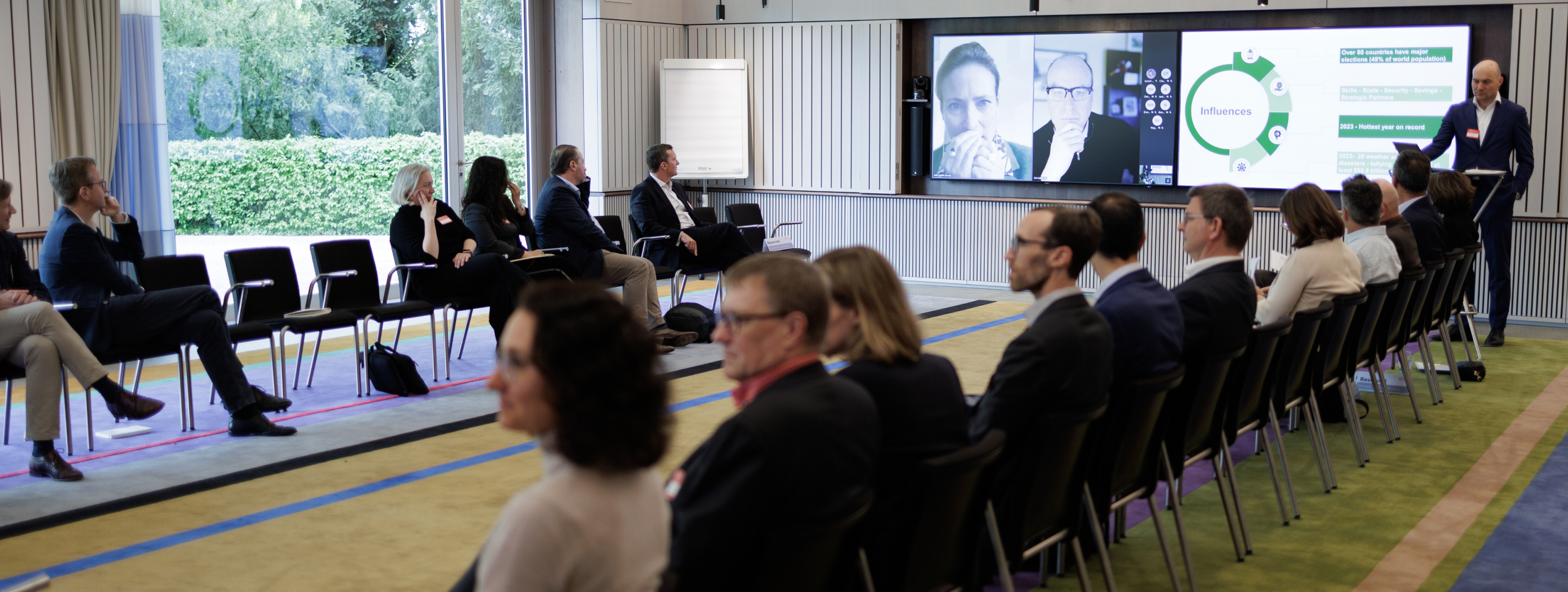Zurich, Switzerland, kindly hosted by Swiss Re
What can re/insurers offer?
Reducing greenhouse gas (GHG) emissions to meet global climate targets is a matter of urgency. It requires accelerating the deployment of climate technologies, most of which remain in the pre-commercialisation stages. Drawing from Geneva Association research, this conference explored how P&C re/insurers, through their risk engineering expertise, can help overcome the hurdles to expediting the rollout of climate technologies and delved into areas within climate tech projects that may pose challenges to insurability.
Summary
Welcome remarks

Jad Ariss, Managing Director, The Geneva Association
The need to accelerate the deployment of climate technologies to enable clean and reliable energy solutions and support the transition of hard-to-abate sectors such as steel and aviation is pressing. There are, however, massive funding gaps for these technologies, most of which remain in the very early phases of development. To tackle this, transformative public policies have begun to emerge in recent years, which aim to create a more favorable environment for the development of climate tech. Cross-sectoral collaboration involving insurers is also needed to create innovative risk management and financing solutions to address investment gaps and other hindering factors.
Moderated interview

Christian Mumenthaler, Group CEO, Swiss Re
Decarbonisation requires significant and transformative change across industries and along entire value chains. High-emitting sectors are energy intensive. They require green energy solutions and must achieve economies of scale.
Significant progress has been made with solar and wind technologies, with production costs now lower than fossil and non-fossil alternatives in most countries. Innovation in technology development for smart grids and power storage solutions needs to be complemented with the development of green energy sources to meet urban and industrial demand.
Through their risk engineering, underwriting and investment functions, re/insurers can play a key role in enabling the development of climate technologies. There are also opportunities to support clients’ transitions, including by providing climate solutions to help tackle emissions. This is also highly relevant for re/insurers’ own net-zero efforts. Re/insurers need to develop new metrics and start measuring their carbon footprint across their balance sheets, as well as form a better understanding of the transition readiness, capacity and willingness of clients, investees and vendors.
Setting the scene

Maryam Golnaraghi, The Geneva Association
The Geneva Association’s research on climate tech and insurance focuses on leveraging the expertise of insurers to unlock capital and expedite the market readiness of emerging climate technologies.
There are clear benefits to involving re/insurers earlier, from the demonstration and early-deployment stages. These include the development of risk management solutions to enhance project insurability.
A novel Insurability Readiness Framework (IRF), developed by The Geneva Association in collaboration with other stakeholders to classify the risks involved in projects into seven insurance-relevant categories, facilitates informed conversations between climate tech stakeholders and re/insurers. It allows risks to be considered from an early stage and risk mitigation strategies that are aligned with insurance expectations to be developed. Data requirements can also be identified on a tech-by-tech basis for monitoring, risk assessment and risk management purposes.
Panel session: Boosting the Insurability of Climate Tech

Moderator: Lesley Harding, Liberty Mutual
Speakers: William Dean, U.S. DoE; Tom Dickson, New Energy Risk; Jonathan Eckart, Breakthrough Energy; Joachim Meister, Worley; Miguel Senac-Gayarre, Swiss Re; Stefan Thumm, Allianz Commercial
Project finance is increasingly playing a role in the pre-commercialisation stages of climate technologies, with the aim of attracting debt financing. Access to affordable insurance solutions is crucial for the market readiness of emerging climate tech, but assessing insurability conditions is complex and will require time.
Project developers need to consider insurance needs very early on when planning first-of-a-kind pilots. Insurance-related issues will evolve significantly as the technology progresses to the commercialisation stages. Involving re/insurers from the beginning will enable data sharing and eventually risk diversification through the creation of insurance pools. Insurers may also be able to contribute to the development of standards and codes of practice for project replication.
Breakout session 1: Complex Green Hydrogen Projects from an Insurance Lens

Co-facilitators: Stefan Thumm, Allianz; and Laura Watson, AXA XL
Lead discussants: Joachim Meister, Worley; Thomas Koch Blank, RMI; Harald Dimpflmaier, Allianz; Nicole Vermeulen, Hy24; Massimo Giachino, Swiss Re
Complex green hydrogen projects involve hydrogen production, transformation into transportable carriers/products (such as liquid hydrogen, ammonia or methanol), storage and transportation to end users via ships, pipelines, etc. A final deconversion process of the transported product back to hydrogen at the end user's location may also be necessary. Interdependencies across these components pose significant risks; a failure in one can disrupt the entire value chain and affect business continuity. Additionally, the processes involved in each step are costly and complex, with numerous safety issues.
The IRF reveals challenging risks from an insurance perspective, including technology risks, project information and organisation risks, location-specific physical climate risks, business interruption and supply chain risks, and issues with assessing the long-term viability and insurability of projects.
Collaboration for the development of industry standards and codes of practice should be expedited. Recent developments in public policy and government programmes are crucial to closing the significant commercial gap, accelerating scaling, supporting technology vendors with small balance sheets to scale, and underwriting the first projects.
Breakout session 2: Carbon Management from an Insurance Lens

Co-Facilitators: Joe Dutton, AXIS Capital; Rajesh Pawar, U.S. DoE
Lead discussants: Mischa Repmann, Swiss Re; Natalia Dorfman, Kita; Paul Zakkour, CarbonCounts; Beth Hebditch, Carbon Capture and Storage Association; Richard Metcalfe, Quintessa; Jim White, British Geological Survey
The scalability of the carbon management industry heavily depends on the long-term durability of carbon storage systems, particularly concerning the potential for future CO2 reversal events (i.e. release back into the atmosphere). The integrity of carbon markets involving long-term CO2 storage operations is also significantly impacted by these challenges and related uncertainties. The unreliability of measuring mechanisms complicates the assessment of loss size, indemnity and pricing aspects.
Public-private partnerships (PPPs) may be a viable option for developing insurance solutions, with governments potentially serving as insurers of last resort, akin to insurance for nuclear power. Various risks, including legal, finance, compliance and litigation risks, may arise in shorter time horizons, alongside site-specific risks and community-acceptance issues that could lead to litigation and reputational risk.
Geological storage poses particular risks, including a higher potential for containment failure and CO2 leakage through geological faults, fractures and unexpected lateral migration, especially legacy wells, which pose the most significant risk of leakage and potential environmental issues such as water contamination. In-situ mineralisation introduces concerns such as uncontrolled rock formation and potential volume changes affecting subsurface integrity, as well as engineering fractures like fracking, which increases the risk of induced seismicity and ground movement.
Project information and organisation risk may include interface with other storage projects, particularly in cases involving multiple injections within a single geological formation, potentially heightening the risk for CO2 leakage.
Breakout session 3: Long Duration Energy Storage (LDES) from an Insurance Lens

Facilitator: Thomas Krismer, Munich Re
Lead discussants: Max Benz, Allianz; Rainer Egloff, Swiss Re; Alejandro Olveira, Worley; Jim Cabot, Breakthrough Energy; Julia Souder, Long Duration Energy Storage Council
The transition to net zero requires an integrated LDES-centric energy system. These technologies allow energy generated via renewable solutions to be stored – from hours, to weeks, to seasons. To unlock the benefits, we must consider the overlap of power, heat and hydrogen, as well as a range of different technologies that can support each other to maximise system flexibility and provide reliable low-carbon energy whenever customers require it. Renewable power capacity is on track to grow by 2.5 by the end of the decade. Investment in renewables and energy storage solutions has significantly increased, particularly in China and India.
A range of public policy and government solutions can help expedite the development and deployment of these technologies. Insurance can help unlock capital and aid market readiness, which in turn can bring other benefits such as improvements in the utilisation of renewable power generation infrastructure. The IRF can help identify information gaps on risks, build common knowledge about the risks associated with these technologies and aid in managing them.
Through the LDES Council working group on finance, re/insurers can engage with other stakeholders to prioritise technologies, explore insurability conditions, and emphasise the importance of risk mitigation measures and the need for standards and codes of practice.
Panel session: The Way Forward on Climate Tech

Moderator: Ernst Rauch, Munich Re
Speakers: Maria Arana, Marsh; Dick Benschop, Mission Possible Partnership; Chris Greig, Princeton University, Andlinger Center for Energy & Environment; Faris Nimri, Swiss Re; Brian O’Hanlon, Rocky Mountain Institute
Industrial decarbonisation is underway, with many companies in hard-to-abate sectors progressing from commitments to announcing projects. Numerous climate technologies are being developed by small entrepreneurial companies, which may not necessarily understand the importance of risk management and the role of insurance. While insurance brokers play an important role in the development of insurance markets for already commercialised technologies, other mechanisms are needed for technologies that remain in the pre-commercialisation stages. Climate technology hubs, governments and platforms with access to projects could be used to facilitate this. Alternative solutions such as public-private partnerships may be needed in cases where insurability is particularly challenging.
Moving forward, efforts are needed to compile databases on the risks of climate technologies. The development of standards will also make financing, permitting and project replication easier.






